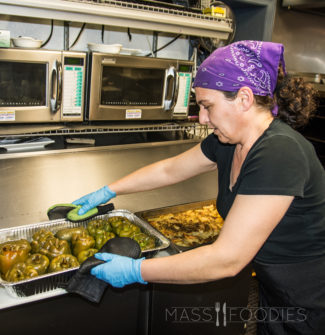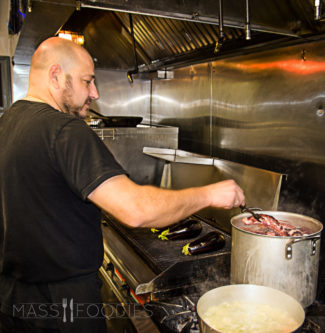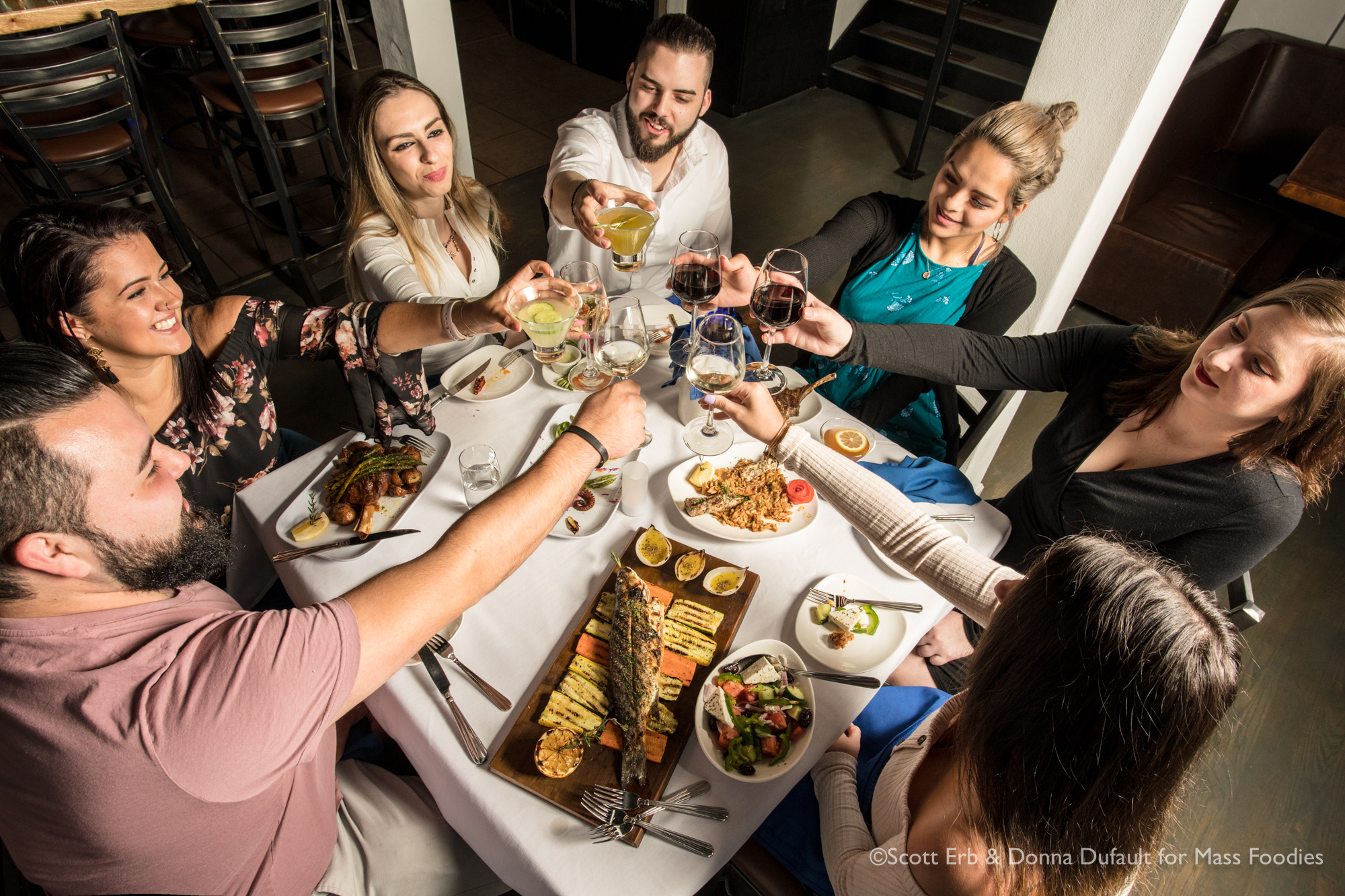
It’s not that Pano Georgiadis doesn’t believe in curses, he’s just not worried. In fact, the first thing he did when he moved Meze to 166 Shrewsbury Street in late March was have a Greek Orthodox priest bless the space.
Plus, he has a wall of evil eyes to ward off any ill will. “Evil eyes are called matis,” he explains, “They’re kind of like an old school, superstitious thing in Greece to protect you from people who wish badly upon you. Envious people.”

Georgiadis knows about the scandal that entwined his building’s two previous tenants, The Usual and The Chameleon, and resulted in their ultimate takedown as part of a money laundering conspiracy. He was helping out next door at the time, working at his family’s restaurant—Meze Greek Tapas.
The original Meze belonged to Georgiadis’ father, Sotirios, who also owned nine Uncle Sam’s Pizza shops that stretched from Worcester to Amherst along Route 9.
“I grew up in the restaurant industry,” the younger Georgiadis recalls. “I remember putting together pizza boxes when I was three-years-old.”
At age 19, Georgiadis took over Uncle Sam’s Pizza in Leicester. Within five years, he had earned his real estate license—a detail as important to Meze’s good fortune as the priest’s blessing or the matis.
When the lease was up for Meze at 156 Shrewsbury Street, Georgiadis remembers his father saying, “This restaurant was ten times better than running a pizza place, but you know, I’m tired and I want to sell. I want to live my life and maybe move to Greece.”
That’s when the building next door at 166 Shrewsbury Street went on the market. Georgiadis had observed the prime property sitting for over a year under the government’s watch.
“So, everyone’s telling me that it’s cursed and all that stuff,” Georgiadis recalls, “But, for whatever reason, literally everything that could have fallen into place for me did fall into place. There was not one negative. Not one road bump. It was very, very strange.”
Georgiadis called about the listing right away and kept a close eye on the property. He’d wave to everyone who came to see the building and the agent from Colliers International began expecting to receive follow up calls from Georgiadis after each new showing.
“I wasn’t sleeping,” he remembers. “The starting asking price was $525,000 and there were 10 bidders; a lot of them had big money to throw around. There was no way I would’ve been able to stand a chance with them. They were willing to put up to the millions for a building on Shrewsbury Street.”
Georgiadis was not deterred. As a real estate agent, he had the benefit of completing his own paperwork and avoiding the lag time of a middle man.
“I have no idea how they paid attention to me, but I put in a price of $510,000 and they accepted,” he says, “Instead of going to a bidding war against these people I couldn’t compete with, they stopped listening to everyone else because I was calling so much. I actually bought the building for $15,000 less than their starting price. I have no idea how.”
The space itself has taken a great deal of attention. “I came in here and it was trashed. I guess someone had broken in after The Chameleon closed down,” Georgiadis recalls.
“The previous owners had yellow tile floors, neon green wallpaper, and industrial style lights everywhere,” he says, “It was dark. Thank God they took the time to install windows that let in so much natural light.”
He stripped the floor and restained it in a lighter shade of gray. “I didn’t want it to be blue and white Greek columns everywhere with tacky Greek statues,” Georgiadis says, “I love clean beauty and simplicity.”
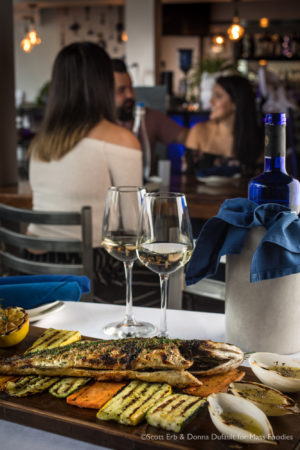 Georgiadis spent a month and a half trying to find the right stucco. “In Greece, on all the islands, they do a limestone stucco on the buildings. It was the biggest pain for at least three weeks. There was just dust everywhere. We could not get the dust out no matter how much we vacuumed and mopped. It gave some nice texturing to the walls and we put in nice arches instead of sharp corners,” he says.
Georgiadis spent a month and a half trying to find the right stucco. “In Greece, on all the islands, they do a limestone stucco on the buildings. It was the biggest pain for at least three weeks. There was just dust everywhere. We could not get the dust out no matter how much we vacuumed and mopped. It gave some nice texturing to the walls and we put in nice arches instead of sharp corners,” he says.
With that, Meze Estiatorio found new life.
The curse may have been broken, but that didn’t mean opening a new restaurant came easily. Georgiadis rebranded as Meze Estiatorio and changed 70% of his father’s original menu.
“Where next door was tapas, estiatoria is a Greek word that aims for fine dining, sitting down, having courses, having an entree,” he explains. “Of course, we kept the most popular things on the menu. We didn’t want anyone to go crazy and not have their saganaki.”
It was important to Georgiadis to maintain Meze’s Greek authenticity. “At the old Meze, we had a Greek salad and a village salad. The only difference between the Greek salad and the village salad was that one had lettuce in it because Greek salads in America have lettuce,” he explains. “If you go to Greece and you ask for a salad, they don’t put lettuce in it. I decided to do a straight Greek salad because as much as I want everyone to be happy, I really want to be a niche where you decide to drive to Shrewsbury Street instead of flying to Greece and you get the same thing.”
Most of Meze’s ingredients are imported. “Back in the day, if you said you imported all of your products from Greece, that meant they sat on a ship for a long time,” Georgiadis says, “But now, we’re able to order and get everything here really quickly.”
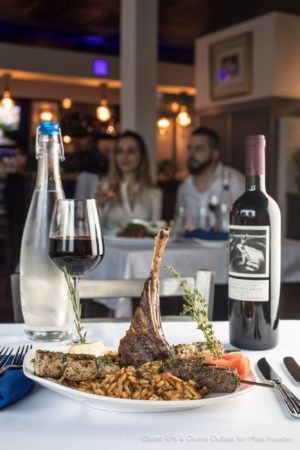 He cites the branzino as an example. “It’s Mediterranean sea bass; they catch it, put it on ice and fly it into Logan,” he explains. “Within two days of the fish swimming in the Mediterranean in Greece, we get it on ice in Boston.”
He cites the branzino as an example. “It’s Mediterranean sea bass; they catch it, put it on ice and fly it into Logan,” he explains. “Within two days of the fish swimming in the Mediterranean in Greece, we get it on ice in Boston.”
Georgiadis also recommends the youvetsi, saying, “Youvetsi was something that wasn’t on the menu next door. I put it on because I absolutely love it. It’s stove braised short rib beef with Orzo and a red sauce. It’s a very hearty meal, but it goes really well with a glass of red wine.”
The wine itself proved a laborious venture. “The wines were my everything when I wanted to change the menu and make this place reflect me,” says Georgiadis. “Next door was fine, but I wanted it to become something better and I felt that there were just so many good products coming out of Greece that not a lot of people knew here. Now, we have the most exclusive Greek wines in one restaurant in all of New England.”
The moment that it became clear he was going to close on the building at 166 Shrewsbury Street, Georgiadis planned a trip to Greece. This wasn’t entirely out of the ordinary; he has gone to Greece nearly every summer for his whole life; however, this trip was going to be different.
“I traveled around. I drove south. I rented a villa by the beach and I tried taking in as much scenery as I could,” he recalls. “I tried going to as many restaurants as possible to get an idea of how I wanted to style our place. I tried a lot of wine.”
Georgiadis favors varietals that are unique to Greece like xinomavro, agiorgitiko, and assyrtik. “One thing about Greek wines is that a lot of them have been there for hundreds and hundreds of years. Phylloxera killed like 80% of Europe’s wine in the 19th century,” he explains, “It killed tons and tons of grapes but Greece has a unique soil that is very sandy and they weren’t as affected by phylloxera so even France began importing their wine from Greece.”
Like Greek wine to phylloxera, Meze is impervious to the storied history of 166 Shrewsbury Street. Meze Estiatorio is the product of four generations of recipes, tenacity, and tradition. Pano Georgiadis has the grit to rise above the rest.


